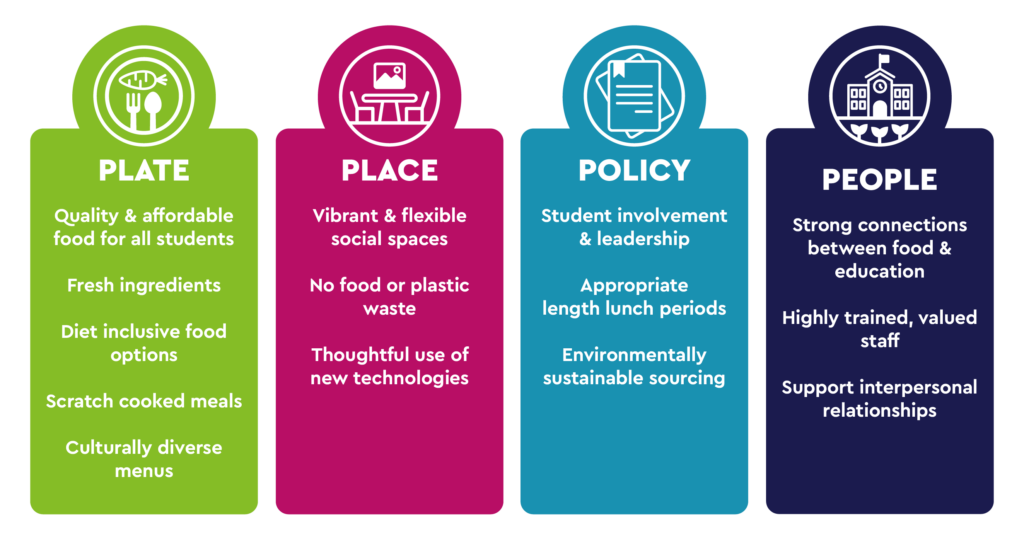educators, schools, and policy makers
Make students the designers of their learning experiences
For educators
project based learning
Decades of research suggest that students learn better by doing. (Thomas, 2000) The Project-based Learning (PBL) framework is a pedagogy that allows students to do just this by positioning students as designers and leaders of their own learning, focusing on real-world problems and contexts, and developing knowledge through inquiry. (Barron and Darling-Hammond 2008) The Lunch Club platform follows the “Gold Standards” for PBL (www.pblworks.org), and guides the students through the scaffolded process of designing their own equity-centered cafeteria project. Educators act as facilitators, supporting student progress and providing feedback without the need to create project structure or lesson plans.
The Lunch club aligns with national standards
Common Core Anchor Standards
CCSS.ELA-LITERACY.CCRA.SL.1
Prepare for and participate effectively in a range of conversations and collaborations with diverse partners, building on others’ ideas and expressing their own clearly and persuasively.
CCSS.ELA-LITERACY.CCRA.SL.2
Integrate and evaluate information presented in diverse media and formats, including visually, quantitatively, and orally.
CCSS.ELA-LITERACY.CCRA.SL.4
Present information, findings, and supporting evidence such that listeners can follow the line of reasoning and the organization, development, and style are appropriate to task, purpose, and audience
CCSS.ELA-LITERACY.CCRA.SL.5
Make strategic use of digital media and visual displays of data to express information and enhance understanding of presentations.
Next Generation Science Standards
K-ESS3-3. Communicate solutions that will reduce the impact of humans on the land, water, air, and/or other living things in the local environment.
MS-ESS3-3. Apply scientific principles to design a method for monitoring and minimizing a human impact on the environment.
National Curriculum Standards for Social Studies Themes
3. People, Places, and Environments:
“experiences that provide for the study of people, places, and environments.”
7. Power, Authority, and Governance:
“experiences that provide for the study of how people create, interact with, and change structures of power, authority, and governance.”
10. Civic Ideals and Practices:
“experiences that provide for the study of the ideals, principles, and practices of citizenship in a democratic republic.”
Common Core State Standards - English and Language Arts
W.CCR.4 “Produce clear and coherent writing in which the development, organization, and style are appropriate to task, purpose, and audience”
SL.CCR.4 “Present information, findings, and supporting evidence such that listeners can follow the line of reasoning and the organization, development, and style are appropriate to task, purpose, and audience.”
For Schools
Free and accessible Design curriculum
The Lunch Club Platform is free and accessible to all students with a basic internet connection. Design tools are available in a digital format, ready to print, or pre-packaged and mailed to students. To engage with the platform, students need to simply create a free account which allows them to track their progress throughout their project.
Systems thinking in the context of school
The Lunch Club platform introduces students to systems thinking in the real-world context of their cafeteria. Rather than thinking about the cafeteria as a simple room that serves food, students will conceptualize how the cafeteria functions as a complex and integrated network of 4 systems: plate, place, people, and policy.
For policy and decision makers
Give Students agency
High school students want to have a say in their food choices and the design of their spaces. Including their voices in your decision-making process is an important step to creating more equitable and sustainable cafeterias in our schools. There are many meaningful ways to include students in this process. We encourage you to explore student ideas on our share page, consider how your decisions align with our goals, and utilize the tools on our home page to gather student feedback. Download the Goals >>
Align with the student-generated cafeteria goals

human centered design at its core
The Lunch Club was developed with students for students
In the Fall of 2019, Human Centered Designer Larrea Young started exploring equity and access issues in public high schools. During her research, she discovered that students felt they had no voice in their cafeterias and that their ability to have choice in what and how they ate was being limited. This was especially true for students that relied on the National School Lunch Program for their meals. To address this problem, Larrea started asking high school students to envision what they wanted to see in their cafeteria. This process developed into The Lunch Club platform, which hopes to empower all students to act as change agents in their schools, their community, and their planet.
Get In Touch
